MUNICIPAL HOME RULE - Florida League of Cities
advertisement
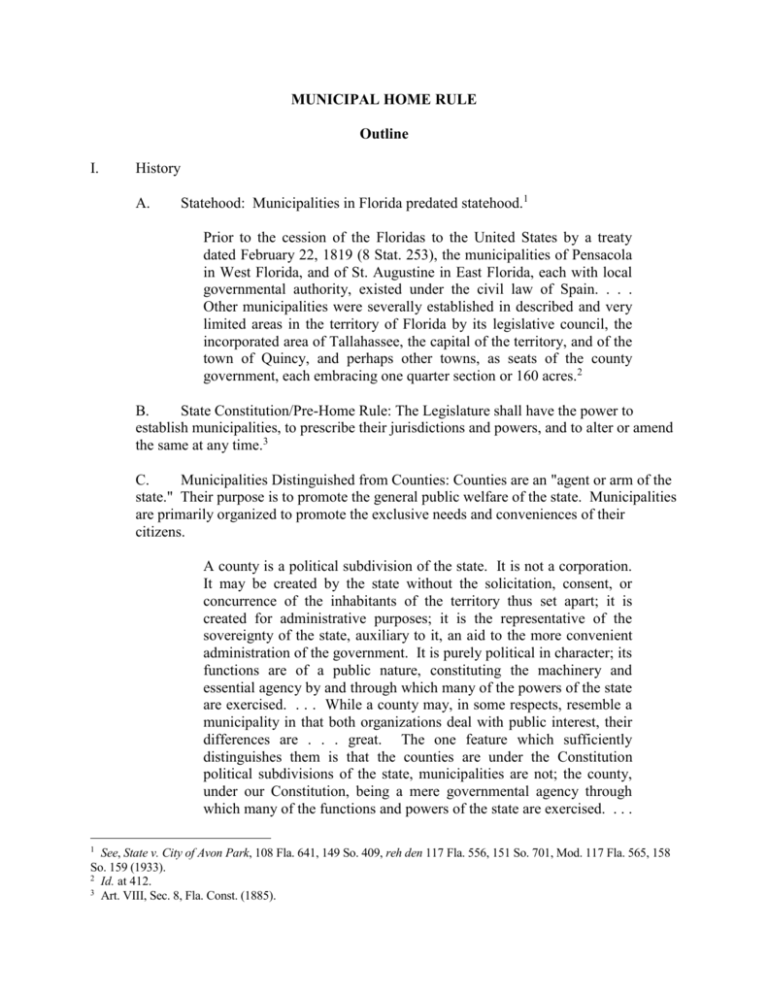
MUNICIPAL HOME RULE Outline I. History A. Statehood: Municipalities in Florida predated statehood.1 Prior to the cession of the Floridas to the United States by a treaty dated February 22, 1819 (8 Stat. 253), the municipalities of Pensacola in West Florida, and of St. Augustine in East Florida, each with local governmental authority, existed under the civil law of Spain. . . . Other municipalities were severally established in described and very limited areas in the territory of Florida by its legislative council, the incorporated area of Tallahassee, the capital of the territory, and of the town of Quincy, and perhaps other towns, as seats of the county government, each embracing one quarter section or 160 acres.2 B. State Constitution/Pre-Home Rule: The Legislature shall have the power to establish municipalities, to prescribe their jurisdictions and powers, and to alter or amend the same at any time.3 C. Municipalities Distinguished from Counties: Counties are an "agent or arm of the state." Their purpose is to promote the general public welfare of the state. Municipalities are primarily organized to promote the exclusive needs and conveniences of their citizens. A county is a political subdivision of the state. It is not a corporation. It may be created by the state without the solicitation, consent, or concurrence of the inhabitants of the territory thus set apart; it is created for administrative purposes; it is the representative of the sovereignty of the state, auxiliary to it, an aid to the more convenient administration of the government. It is purely political in character; its functions are of a public nature, constituting the machinery and essential agency by and through which many of the powers of the state are exercised. . . . While a county may, in some respects, resemble a municipality in that both organizations deal with public interest, their differences are . . . great. The one feature which sufficiently distinguishes them is that the counties are under the Constitution political subdivisions of the state, municipalities are not; the county, under our Constitution, being a mere governmental agency through which many of the functions and powers of the state are exercised. . . . 1 See, State v. City of Avon Park, 108 Fla. 641, 149 So. 409, reh den 117 Fla. 556, 151 So. 701, Mod. 117 Fla. 565, 158 So. 159 (1933). 2 Id. at 412. 3 Art. VIII, Sec. 8, Fla. Const. (1885). Many of the powers exercised by a municipality . . . are, in their nature and character, corporate rather than governmental. The corporation being organized voluntarily by the citizens of the locality for the purpose of local government . . . .4 As a general concept a municipality, commonly called a city or a town, may be regarded as a legally incorporated or duly authorized association of the inhabitants of a particularly designated place or limited territorial area, established for a prescribed local governmental and public utility or other public purposes. . . . In remote antiquity cities were established in the gradual development of human civilization; and each city was maintained by virtue of the organized and disciplined collective power of the inhabitants under varying forms of government, designed to secure the safety and welfare of the people.5 Municipal government exists primarily for the performance of municipal or governmental functions, for the happiness, convenience, health and general welfare of the inhabitants of a local community.6 D. Dillon’s Rule: Municipalities possess only those powers expressly granted by the state legislature, those fairly implied from the powers expressly granted, and those essential to the declared purposes of the corporation. If reasonable doubt exists as to whether a municipality can exercise a certain power, the doubt is, as a matter of law, resolved against the municipality. 1. City had no power to enter into lease whereby municipal property would be leased to a private individual for development as a hotel for private profit.7 In Florida, the legislature has plenary control over municipalities subject to such restrictions as may be found in the state or United States Constitutions, but if a doubt exists as to whether a statute authorizes a municipality to exercise a certain power, then that doubt should, as a matter of law, be resolved by the courts against the municipality.8 2. City had no power to enact ordinance which made it unlawful for any person to possess, use, keep or store any submachine gun within the City of Jacksonville.9 4 5 6 7 8 9 Keggin v. Hillsborough County, 71 Fla. 356, 71 So. 372, 372-373 (1916). City of Avon Park, 149 So. at 412. City of Clearwater v. Caldwell, 75 So. 2d 765, 767 (Fla. 1954). Caldwell, supra. Caldwell, 75 So. 2d at 766. Rinzler v. Carson, 262 So. 2d 661 (Fla. 1972). 2 In order for a municipal ordinance to prohibit that which is allowed by the general laws of the state, there must be an express legislative grant by the state to the municipality authorizing such prohibition.10 II. The Home Rule Amendment A. The Home Rule Amendment/Municipal Home Rule Powers Act: Municipalities shall have governmental, corporate and proprietary powers to enable them to conduct municipal government, perform municipal functions and render municipal services, and may exercise any power for municipal purposes except as otherwise provided by law.11 B. Home Rule Powers: Every municipality in this state has the authority to conduct municipal government, or perform municipal functions, and render municipal services. The only limitation on that power is that it must be exercised for a valid "municipal purpose." It would follow that municipalities are not dependent upon the state legislature for further authorization. Legislative statutes are relevant only to determine limitations of authority. 1. City had the home rule authority to issue "double advance refunding bonds."12 Article VII, Section 2, Fla. Const., expressly grants to every municipality in this state authority to conduct municipal government, or perform municipal functions, and render municipal services. The only limitation on that power is that it must be exercised for a valid "municipal purpose." It would follow that municipalities are not dependent upon the legislature for further authorization. Legislative statutes are relevant only to determine limitations of authority.13 2. City had the home rule authority to levy special assessments notwithstanding the fact the special assessments were not authorized by state law and the city failed to follow state law when levying the special assessments.14 It is conceded that the City of Boca Raton did not follow the requirements of ch. 170 in its attempt to impose special assessment in this case. This argument cannot prevail because it is evident that ch. 170 is not the only method by which municipalities may levy a special assessment. . . . Thus, we hold that the City of Boca 10 11 12 13 14 Id. at 668. Art. VIII, Sec. 2(b), Fla. Const. (1968). State v. City of Sunrise, 354 So. 2d 1208 (Fla. 1978). Id. at 1208. City of Boca Raton v. State, 595 So. 2d 25 (Fla. 1992). 3 Raton had the authority to impose a special assessment under its home rule power.15 3. City had the home rule authority to seek a total taking of property, rather than a partial taking of property, in order to eliminate a business damage claim notwithstanding the fact it did not need all of the property.16 Although section 166.401, Florida Statutes (1989), purports to authorize municipalities to exercise eminent domain powers, municipalities could exercise those powers for a valid municipal purpose without any such "grant" of authority. If the state has the power to take particular land for public purposes, then a municipality may also exercise that power unless it is "expressly prohibited." Although section 166.401(2) does not expressly grant the taking of an entire parcel by a municipality to save money, it also does not expressly prohibit a municipality from doing so.17 III. Limitations on Home Rule Authority: A. Municipalities may exercise any power for "municipal purposes," except when "expressly prohibited by law."18 B. Municipal Purpose: Any activity or power which may be exercised by the state or its political subdivisions. All activities essential to the health, morals, protection, and welfare of the community.19 1. 15 16 17 18 19 Activities that serve a "municipal purpose." a. Providing daycare educational facilities. b. Financing a convention center. c. Construction and operation of a marina and a civic auditorium. d. Construction and operation of a fishing pier. e. Construction and operation of a parking garage. f. Ownership and operation of an auditorium. g. Maintenance and operation of a radio broadcasting system. Id. at 29-30. City of Ocala v. Nye, 608 So. 2d 15 (Fla. 1992). Id. at 17. Sec. 166.021(1), Fla. Stat. Sec. 166.021(2), Fla. Stat.; State v. City of Jacksonville, 50 So. 2d 532 (Fla. 1951). 4 h. Promoting the community. i. Acquisition and maintenance of a golf course. j. Using public property for a sport stadium. k. Sale of souvenir photographs. l. Furnishing catering services in a civic center. 2. Competition with Business Irrelevant: The fact the municipality competes with private business is not relevant to the question of whether the activity constitutes a municipal purpose. 3. Activities that don’t constitute a municipal purpose. a. Borrowing money simply to reinvest the money and derive a profit on the investment. b. Opting out of an otherwise valid county ordinance. C. Prohibited by Law: Florida law provides four fundamental limitations on the exercise of municipal home rule authority: the state legislature, the citizens of the municipality, the state constitution, and a county’s charter. 1. The State Legislature a. The power of the state legislature over municipal corporations in Florida is plenary. City had no authority to pass an ordinance dissolving a utility authority created by special act of the legislature.20 The legislature's retained power is now one of limitation rather than one of grace, but it remains in all-pervasive power, nonetheless.21 b. Conflict/Preemption: Municipal ordinances must give way to state law to the extent the ordinance "conflicts with the law" and a municipality’s power to regulate in a particular area may be "preempted by general law." The concept of conflict may be distinguished from the concept of preemption in that the latter effectively precludes all municipal 20 21 Lake Worth Utilities v. City of Lake Worth, 468 So. 2d 215 (Fla. 1985). Id. at 217. 5 regulation in a given area while the former permits regulation, but only to the extent it supplements state law. Preemption essentially takes a topic or a field in which local government might otherwise establish appropriate local laws and reserves that topic for regulation exclusively by the legislature.22 In a field where both the State and local government can legislate concurrently, a county cannot enact an ordinance that directly conflicts with a state statute. Local ordinances are inferior to the laws of the state and must not conflict with any controlling provision of a statute. If a county has enacted such an inconsistent ordinance, the ordinance must be declared null and void.23 c. Preemption Doctrine: Preemption may be express or implied. Express preemption requires a specific legislative statement; it cannot be implied or inferred. Express preemption of a field by the legislature must be accomplished by clear language stating that intent. In cases where the legislature expressly or specifically preempts an area, there is no problem with ascertaining what the legislature intended.24 * * * Preemption is implied when the legislative scheme is so pervasive as to evidence an intent to preempt the particular area, and where strong public policy reasons exist for finding such an area to be preempted by the legislature. Implied preemption is found where the state legislative scheme of regulation is pervasive and the local legislation would present the danger of conflict with that pervasive regulatory scheme. In determining if implied preemption applies, the court must look to the provisions of the whole law, and to its object and policy. The nature of the power exerted by the legislature, the object sought to be obtained by the statute at issue, and the character of the obligations imposed by the statute are all vital to this determination.25 22 23 24 25 City of Hollywood v. Mulligan, 934 So. 2d 1238, 1243 (Fla. 2006). Phantom of Brevard, Inc. v. Brevard County, 3 So. 3d 309, 314 (Fla. 2008). Sarasota Alliance for Fair Elections, Inc. v. Browning, 28 So. 3d 880, 886 (Fla. 2010). Id. 6 1) The public records laws impliedly preempted a local government's policy that government employee personnel files could be automatically withheld from release to the public for 48 hours.26 2) The workers' compensation laws impliedly preempted a city ordinance that reduced an injured employee's disability pension benefits by the amount of workers' compensation benefits paid the employee.27 3) Florida law vesting the Public Service Commission with exclusive regulatory jurisdiction over public utilities impliedly preempted a city ordinance that required the electric power company to relocate its power lines underground.28 4) The more a state legislative scheme regulating a particular topic permits local government to regulate aspects of the topic, the more likely the court will not imply preemption. While we agree that Florida's Election Code is a detailed and extensive statutory scheme, we conclude that the legislature's grant of power to local authorities in regard to many aspects of the election process does not evince an attempt to preempt the field of election laws.29 5) The more the ordinance deals with a uniquely local issue, the more likely the courts will hold the ordinance is not impliedly preempted by state law. In analogous cases, Florida courts have not found an implied preemption of local ordinances which address local issues. As even the Second District explained in the instant case, "[i]t generally serves no useful public policy to prohibit local government from deciding local issues." . . . In the instant case, the legislature clearly did not deprive local governments of all local power in regard to elections. To the contrary, the Election Code specifically delegates certain responsibilities and powers to local authorities, including the choice of voting systems to be used in each locality as long as 26 27 28 29 Tribune Co. v. Cannella, 458 So. 2d 1075 (Fla. 1984). Barragan v. City of Miami, 545 So. 2d 252 (Fla. 1989). Florida Power Corp. v. Seminole County, 579 So. 2d 105 (Fla. 1991). Sarasota Alliance for Fair Elections, Inc., 28 So. 3d at 886-887. 7 the system has been approved by the Department of State. This statutory scheme undoubtedly recognizes that local governments are in the best position to make some decisions for their localities. In light of this, we conclude that the Election Code does not impliedly preempt the field of elections law.30 d. Conflict: A conflict exists if the person must violate state law in order to comply with the municipal ordinance or violate the ordinance in order to comply with state law. No conflict exists if the person can satisfy both state law and the municipal ordinance. The test of conflict between a local government enactment and state law is whether one must violate one provision in order to comply with the other.31 1) Typically, a local ordinance will not conflict with a state law if the ordinance simply provides more stringent requirements than those contained in state law or provides additional requirements to those contained in state law.32 2) Typically, a local ordinance will not conflict with state law where the local government simply chooses to legislate in an area where the legislature chose to remain silent.33 3) The fact state law provides it is to be "applied uniformly throughout the state" doesn't automatically mean a local ordinance addressing the same topic conflicts with state law.34 2. The Municipality’s Citizens: A municipality’s charter is like the state’s constitution. It’s the paramount governing instrument of the municipality and is the fundamental law of the citizens that are served by the municipality. a. Charter Amendments: Florida law provides a process by which the citizens of a municipality may submit to the electors of the municipality a proposed amendment to its charter which amendment may place a limitation on the exercise of the municipality’s home rule authority. Once approved by the electors, the amendment becomes a part of the municipality’s charter and thus a part of the municipality’s organic law. 30 31 32 33 34 Id. at 888-889. Id. at 888. Phantom of Brevard, Inc., supra; Sarasota Alliance for Fair Elections, Inc., supra. Mulligan, supra; Phantom of Brevard, Inc., supra. Phantom of Brevard, Inc., supra. 8 Once the citizens of a municipality have spoken through their charter, the citizens are entitled to have the charter provision enforced. Court upheld a charter provision that permitted citizens to initiate a referendum to repeal a zoning ordinance.35 The wisdom of this decision may be questioned in that all zoning changes made in this fashion are subject to the whims of a referendum and to the vicissitudes of the electorate. The other side of the coin is that this is a power that the people have reserved. If the people of Winter Springs choose to give up the power and pass it over solely to a zoning body, that they may do. But that they have not done, and this Court cannot and will not do it for them.36 b. State Law: The citizens’ power to use the charter amendment process to limit municipal home rule authority is limited in the same manner and to the same extent as the governing body's exercise of the municipality's home rule authority. A charter amendment that conflicts with state law will yield to the state law regardless of the fact the municipality’s citizens voted in favor of the charter amendment. 1) Court held citizens' effort to use the initiative process contained in a city's charter to adopt an ordinance requiring binding arbitration in the city's collective bargaining process was invalid because it conflicted with the state's collective bargaining laws.37 2) Court held citizens' effort to amend the city's charter to prohibit the Orlando Utilities Commission from constructing a cold-fire electric generating plant was invalid because it conflicted with state law establishing the Orlando Utilities Commission.38 3. The State Constitution: Florida’s Constitution places several fundamental limitations on the exercise of municipal home rule authority. a. Annexation: The power to define the manner in which municipalities may annex unincorporated areas is vested with the state legislature.39 35 36 37 38 39 Florida Land Company v. City of Winter Springs, 427 So. 2d 170 (Fla. 1983). Id. at 174. West Palm Beach Assn of Firefighters v. City of West Palm Beach, 448 So. 2d 1212 (Fla. 4th DCA 1984). Gaines v. City of Orlando, 450 So. 2d 1174 (Fla. 5th DCA 1984). Art. VIII, Sec. 2(c), Fla. Const. (1968). 9 b. Extra-Territorial Powers: The power to define the manner in which municipalities may exercise extra-territorial powers is vested with the state legislature.40 c. Taxation: A municipality may levy only those taxes authorized by general law of the state legislature. Examples of taxes include public service taxes, occupational license taxes, local option sales taxes, and local option gas taxes. From the foregoing provisions of the Florida Constitution, it is clear that, except for ad valorem taxes, municipalities may be granted the power to levy any tax only by general law. Thus, the question presented is whether the tax imposed by the City of Tampa is authorized by general law. Any tax not authorized by general law must necessarily fall by virtue of the preemption clause of Fla. Const. Art. VII, Sec. 1 (1968).41 As the Florida Constitution and the case law of this state evidence, the state, through the legislative branch of the government, possesses an inherent power to tax, and a municipality may exercise a taxing power only to the extent to which such power has been specifically granted to it by general law.42 d. Fees: "Fees" aren’t "taxes;" therefore, municipalities can raise revenues through fees under the municipality’s home rule authority. Examples of fees include impact fees, service fees, regulatory fees, franchise fees, and special assessments. 1) City has the home rule authority to levy impact fees.43 Raising expansion capital by setting connection charges, which do not exceed a pro rata share of reasonably anticipated costs of expansion, is permissible where expansion is reasonably required, if use of the money collected is limited to meeting the costs of expansion. Users 'who benefit especially, not from the maintenance of the system, but by the extension of the system . . . should bear the cost of that extension.'44 40 41 42 43 44 Id. City of Tampa v. Birdsong Motors, 261 So. 2d 1, 3 (Fla. 1972). Belcher Oil Company v. Dade County, 271 So. 2d 118, 122 (Fla. 1972). Contractors and Builders Assn v. City of Dunedin, 329 So. 2d 314 (Fla. 1976). Id. at 320. (emphasis in original). 10 2) A municipality has the home rule authority to levy fees designed to offset the cost of providing services to its citizens.45 Implicit in the power to provide municipal services is the power to construct, maintain and operate the necessary facilities. The fixing of fair and reasonable rates for utility service provided is an incident of the authority given by the Constitution and statutes to provide and maintain those services.46 In fact, nothing prohibits a city from deriving a modest profit from the operation of its utilities.47 3) Cities have the home rule authority to levy fees designed to offset the cost of regulating activities undertaken within the municipality.48 It is, of course, well settled that the power to regulate includes the power to license as a means of regulating, and that a reasonable license fee may be charged in an amount sufficient to bear 'the expense of issuing the license and the cost of necessary inspection or police surveillance connected with the business or calling license, and all the incidental expenses that are likely to be imposed upon the public in consequence of the business licensed.'49 4) A city has the home rule authority to levy special assessments.50 [A special assessment] is imposed upon the theory that that portion of the community which is required to bear it receives some special or peculiar benefit in the enhancement of value of the property against which it is imposed as a result of the improvement made with the proceeds of the special assessment. It is limited to the property benefited, it is not governed by uniformity and may be determined legislatively or judicially. . . . There are two requirements for the imposition of a valid 45 46 47 48 49 50 Cooksey v. Utilities Commission, 261 So. 2d 129 (Fla. 1972). Id. at 130. Pinellas Apartment Assn v. City of St. Petersburg, 294 So. 2d 776 (Fla. 2d DCA 1974). Tamiami Trail Tours, Inc. v. City of Orlando, 120 So. 2d 170 (Fla. 1960). Id. at 172. City of Boca Raton v. State, 595 So. 2d 25 (Fla. 1992). 11 special assessment. First, the property assessed must derive a special benefit from the service provided. Second, the assessment must be fairly and reasonably apportioned among the properties that receive the special benefit.51 5) A city has the home rule authority to impose franchise fees.52 A franchise fee is a bargained for fee charged a private company for the privilege of using the city's rights-of-way. The franchise fee consists of three main components: it is fair rent for the use of the city's rights-of-way to derive a private profit; it is consideration for the city to agree not to compete with the private party during the term of the franchise agreement; and it is a fee paid the city to offset the costs incurred by the city as a result of the private party's disparate or exclusive use of public property.53 e. Fee v. Tax: The amount of a "fee" must have some rational relationship to the cost of the service, or the cost of regulation, or the benefit derived by the payment. In other words, the payer receives a quid pro quo for the payment. A "tax" on the other hand is a forced extraction for the general benefit of the public. There is no quid pro quo; that is, the payer doesn’t always derive a benefit from the payment. [Fees] are charged in exchange for a particular governmental service which benefits the party paying the fee. . . . [Taxes] are an enforced burden imposed by sovereign right for the support of the government, the administration of law, and the exercise of various functions the sovereign is called on to perform.54 4. County Charters: There are two fundamental forms of county government: non-charter counties and charter counties. The ordinances of a non-charter county apply within the municipalities located in the county except to the extent the county ordinance conflicts with one or more municipal ordinances. In charter counties, the county’s charter must provide which ordinance will prevail in the event of conflict between county and charter ordinances.55 a. County Charter Amendments: Florida law requires a county’s charter provide a method for submitting future charter amendments to the 51 Id. at 29. Santa Rosa County v. Gulf Power Company, 635 So. 2d 96 (Fla. 1st DCA 1994). 53 City of Plant City v. Mayo, 337 So. 2d 966 (Fla. 1976); City of Hialeah Gardens v. Dade County, 348 So. 2d 1174 (Fla. 3d DCA 1977); Santa Rosa County v. Gulf Power Co., 635 So. 2d 96 (Fla. 1st DCA 1994), rev. denied, 645 So. 2d 452 (Fla. 1994); Flores v. City of Miami, 681 So. 2d 803 (Fla. 3d DCA 1996). 54 State v. City of Port Orange, 650 So. 2d 1, 3 (Fla. 1994). 55 Art. VIII, Sec. 1(f) and (g), Fla. Const. (1968). 52 12 electors of the county. Under this procedure, the electors of a charter county can amend the county charter to preempt a municipality from exercising its home rule authority. b. Regulations: A charter county may preempt a municipal regulatory power simply with an affirmative countywide vote of the electors.56 c. Services: A charter county can’t preempt the authority of a municipality to provide services within the municipality without an affirmative vote of the electors of the municipality.57 IV. Advantages of Municipal Home Rule A. It leaves each community free to exercise its police powers in the manner best suited to the needs and conveniences of its citizens. B. With full responsibility resting upon the citizens, they have an opportunity to become educated in the principles and methods of municipal government and to develop common interests in community affairs. C. Unhampered local control permits prompt action in dealing with fresh municipal problems as they arise. D. It relieves the state legislature of the details of local government so it can concentrate on the pressing affairs of state. MunicipalHomeRuleOutlineWebinar 56 Broward County v. City of Fort Lauderdale, 480 So. 2d 631 (Fla. 1985) (sale of handguns). Sarasota County v. Town of Longboat Key, 355 So. 2d 1197 (Fla. 1988) (air and water pollution control services and functions, parks and recreation, roads and bridges, planning and zoning, and law enforcement). 57 13


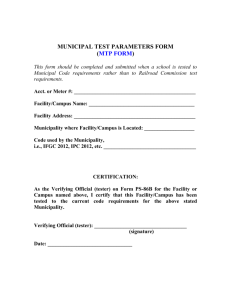
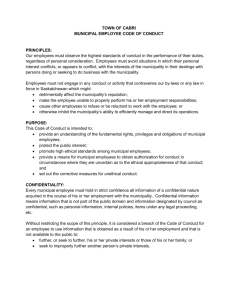
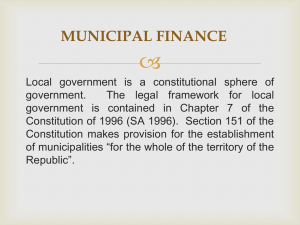
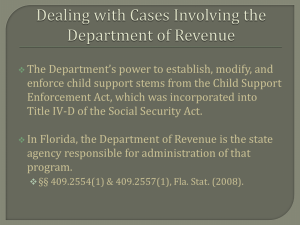
![PW Heavy Equipment Operator [Read More]](http://s3.studylib.net/store/data/006999445_1-8417856b741c62f00336b7e979d86f7e-300x300.png)
